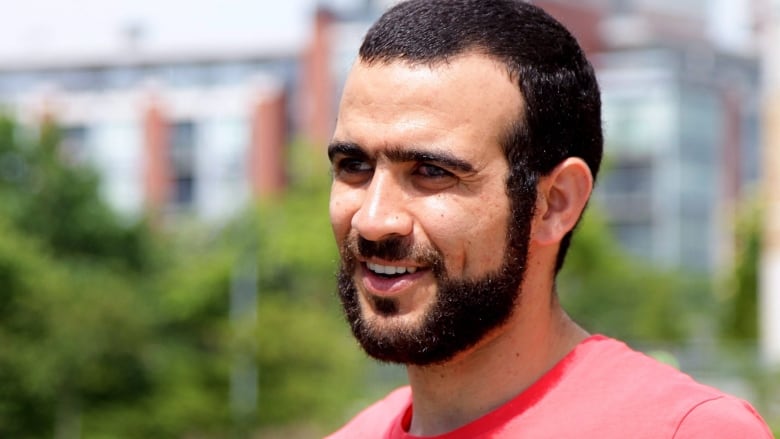Omar Khadr's access to sister remains restricted, Edmonton court rules
Former Guantanamo detainee, now living in Edmonton, has been on bail for 2 years

Former Guantanamo detainee Omar Khadr's application to have unsupervised visits with his sister was denied in an Edmonton courtroom on Friday.
Access to Zaynab Khadr was one of a number of bail conditions the former U.S. prisoner who now lives in Edmonton had hoped the court would ease to give him more personal freedom.
Zaynab Khadr, who, according to her brother's lawyer, lives in the Middle East, has in the past expressed support for al-Qaeda.
Her brother's lawyer, Nathan Whitling, described the restrictions on his client as "onerous," but Court of Queen's Bench Justice June Ross concluded there is nothing to indicate Khadr's sister has changed her views.
Ross refused to remove restrictions stipulating Khadr, 30, communicate with his sister in English only and in the presence of a court-appointed supervisor, his lawyers or bail supervisor.
Khadr declined to comment after leaving the courtroom.
Whitling told reporters outside of the courthouse that Khadr was disappointed.
"He does want to be able to contact his sister and he doesn't see how he's going to be able to speak to his nieces and nephews without having some sort of supervisor present at the time," Whitling said.
Ross also denied Khadr's request to have his travel restrictions softened, meaning he will still require authorization to leave Alberta and travel within Canada.
Whitling argued in the courtroom that Khard's requests to visit his elderly grandparents in Toronto had always been approved in the past.
"He's been getting permission anyway, so it's not a huge big deal, but it is pretty onerous for him to have to seek advanced permission any time he wants to take a trip to Toronto," Whitling told reporters outside of the courthouse.
Khadr did win greater access to the internet as long as he stays away from anything to do with terrorism on the web.
A notorious figure
Zaynab Khadr, 37, became a notorious figure in Canada after she made comments that appeared to support the attacks of Sept. 11, 2001.
Born in Ottawa, she was at one point unable to get a Canadian passport after frequently reporting hers lost.
She was also subject to an RCMP investigation in 2005, but faced no charges. Her third husband, Canadian Joshua Boyle, is reportedly still a Taliban hostage along with his American wife and children in Afghanistan.
In 2008, she went on a hunger strike on Parliament Hill to draw attention to her brother's plight as an American captive in Guantanamo Bay.
Her brother, who recently married, has been on bail for two years.
In an affidavit, Khadr said he has been accepted to a nursing program in Alberta and wishes to put his legal matters behind him.
In July, the federal government paid him a $10.5-million settlement for its role in his treatment at the American military base in Guantanamo Bay, Cuba. He also received an official apology from the federal government.
'I think independently'
No issues have arisen since his release.
"I am now an adult and I think independently," Khadr said in a sworn affidavit. "Even if the members of my family were to wish to influence my religious or other views, they would not be able to control or influence me in any negative manner."

Khadr pleaded guilty to murder for the 2002 death of U.S. Sgt. Christopher Speer in Afghanistan, and to four counts related to terrorism. He made the pleas in Guantanamo Bay in 2010, where he endured torture and was imprisoned for years.
He was eventually released from American custody to serve the bulk of his eight-year sentence in Canada. The Canadian courts found he should be treated as a youth in the justice system because he was 15 when he was in Afghanistan.
Khadr was first granted bail in April 2015. He has been back in court several times since for different reviews of his bail conditions, such as the removal of an electronic monitoring bracelet and a relaxing of his curfew.
Whitling acknowledged Khadr's bail conditions have been gradually eased.
"There's really not all that much left," Whitling said. "What Justice Ross points out is that this is bail pending appeal, so the presumption of innocence doesn't continue to apply. One does have to expect there will be some conditions that are going to continue under these circumstances."
With files from The Canadian Press